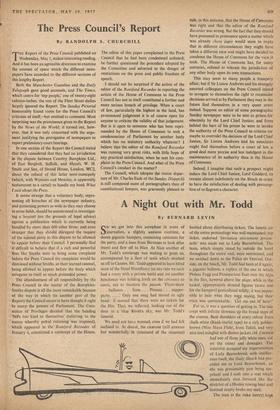The Press Council's Report
By RANDOLPH S. CHURCHILL THE Report of the Press Council published on Wednesday, May 1, makes interesting reading. And it has been an agreeable diversion to examine the amount of space which the different news- papers have accorded to the different sections of this lengthy Report.
Both the Manchester Guardian and the Daily Telegraph gave good accounts, and The Times, which caters for 'top people,' one of twenty-eight column-inches; the rest of the Fleet Street dailies largely ignored the Report. The Sunday Pictorial honourably found room for the Press Council's criticism of itself7-but omitted to comment. Most surprising was the prominence given to the Rep-ort by the News of the World; it turned out, hciw- ever, that it was only concerned with the argu- ment justifying the prerogative of newspapers to report preliminary court hearings.
In one section of the Report the Council stated that they considered that they had no jurisdiction in the dispute between Country Bumpkins Ltd., of East 13ergholt, Suffolk, and Messrs. W. H. Smith and Son, of Strand House, London, WC2, about the refusal of this latter semi-monopOly (which, with Wymans and Menzies, is apparently tantamount to a cartel) to handle my book What I said about the Press.
It seems strange that a voluntary body, repre- senting all branches of the newspaper industry, and posSessing powers as wide as they may choose in some fields, should be uninterested in investigat- ing a boyeott (on the grounds of legal advice) against a publication which is currently being handled by more than 600 other firms; and even stranger that they should disregard the request of the injUred party in this dispute to be allowed to appcar before their Council. I personally find itdifficult to believe that if a rich and powerful firm like' Smiths were to bring some complaint before the Press Council the complaint would be dismissed without Sthiths, or their learned counsel, being alloWed to appear before the body which arrogates to itself so much pretended power.
The abandonment of all responsibility by the Press Council •in the matter of the Bumpkins- Smiths dispute is all the' more remarkable because of the way which (in another part of the Report) the Council seems' to have thought it right to usurp the powers' of Paeliament. The Com- mittee of Privileges decided that 'the heading 'MPs too' kind to themselves' (referring to the means whereby petrol eationinewas impoied), which appeared in the Romforil Recorder of JanuarY 4, constituted a contempt of the House. The editor of this paper complained to the Press Council that he had been condemned unheard; he further questioned the procedure adopted by the Committee and adverted to the danger of restrictions on the press and public freedom of speech.
I should not be surprised if the action of the editor of the Romford Recorder in reporting the action of the House of Commons to the Press Council has not in itself constituted a further and more serious breach of privilege. When a court of law, particularly the highest in the land, has pronounced judgement it is of course open for anyone to criticise the validity of that judgement. But is it open to someone who has been repri- manded by the House of Commons to seek a condemnation of Parliament• by another body which has no statutory authority whatever? I believe that the editor of the Romford Recorder was running very great risks, with little hope of any practical satisfaction, when he sent his com- plaint to the Press Council. And what of the Press Council's conduct in the matter?
The Council, which (despite the recent depar- ture of Mr. Charles Eade of the Sunday Dispatch) is still composed more of pornographers than of constitutional lawyers, was graciously pleased to rule, in this instance, that the House of Commons. was right and that the editor of the Rom ford Recorder was wrong. But the fact that they should have presumed to pronounce upon a matter which was already chose jug& would seem to imply that in different circumstances they might have taken a different view and might have decided to condemn the House of Commons for the view it took. The House of Commons has, for many centuries, refused to tolerate the jurisdiction of any other body upon its own transactions.
This may seem to many people a. trumpery affair; but if Sir Linton Andrews and his strangely assorted colleagues on the Press Council intend to arrogate to themselves the right to reconsider decisions arrived at by Parliament they may in the future find themselves in a very queer street indeed. Suppose an editor of some pornographic Sunday newspaper were to be sent to prison for obscenity by the Lord Chief Justice; and from behind the bars of his prison he were to invoke the authority of the Press Council to criticise (or maybe to overrule) the decision of the Lord Chief Justice, Sir Linton Andrews and his associates might find themselves before a court of law a good deal more precise and less indulgent in the maintenance of its authority than is the House of Commons.
Indeed, I imagine that such• a prospect might induce the Lord Chief Justice, Lord' Goddard, to remain almost indefinitely on the Bench in order to 'have the satisfaction of dealing with presump- tion of so flagrant a character.


































 Previous page
Previous page